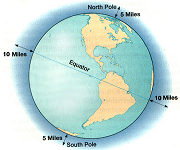-
 The length of a football gridiron (i.e., playing field) is
100 yards between the opposing end zones.
What is the playing field's length in feet?
The length of a football gridiron (i.e., playing field) is
100 yards between the opposing end zones.
What is the playing field's length in feet?
-
 The
Nile River (in Africa) is the world's longest river with
a total length of 4132 mi.
What is the corresponding length of the
Nile River in
kilometers?
The
Nile River (in Africa) is the world's longest river with
a total length of 4132 mi.
What is the corresponding length of the
Nile River in
kilometers?

|
New York City, NY and Los Angeles, CA are the
two largest (i.e., most populous) cities in the
U.S. The
(driving)
distance between them is
approximately 4490 kilometers.
What is the equivalent distance between NYC and
L.A. in miles? |

- The aorta is the
body's largest artery. In an average adult human, the
artery attains a maximum size (diameter where it adjoins the
heart) of about 1.18". What is the maximum size (diameter)
of the aorta in cm? In
mm?

- The tallest
building in the world is currently the
Taipei Financial Center
101 located in
Taiwan (China). The spire atop it extends the
building's height upward to 1671'. How tall is the building
when measured in meters?
 The world's
largest optical telescopes are pair of twin 10-meter
Keck Interferometer telescopes on the summit of
Mauna Kea, Hawai`i. What is the (diameter) size of both
these telescopes' (primary) mirrors in feet?
The world's
largest optical telescopes are pair of twin 10-meter
Keck Interferometer telescopes on the summit of
Mauna Kea, Hawai`i. What is the (diameter) size of both
these telescopes' (primary) mirrors in feet?
-
 The distance between the Earth and Moon averages
approximately 380,000 km.
How many miles correspond to the average
distance between the Earth and Moon?
The distance between the Earth and Moon averages
approximately 380,000 km.
How many miles correspond to the average
distance between the Earth and Moon?
- The average
distance between the Earth and Sun is about 93 million
miles. What would be the equivalent distance in
kilometers?
 |
Mount Everest (in the Himalaya Mountains
along the Tibet-Nepal border) reaches a record
height of 29,035 ft. What is
the corresponding elevation of the summit of Mt.
Everest in miles? In
km? In m?
|

|
- The
Mariana Trench (in the south Pacific Ocean near the
Mariana Islands) extends down to a maximum depth of 35,827
ft (at a point known as the "Challenger
Deep"). How far below sea level is this point in
miles? In km?
In m?
- A fathom, a term long used by mariners
and cartographers to measure water depths, is equal to 6
feet. How many fathoms deep
is the Mariana Trench? (see exercise 10)
- Three of the
wettest locations on Earth are listed below, along with
their average
 annual rainfall. Find the yearly rainfall for each site in
centimeters.
annual rainfall. Find the yearly rainfall for each site in
centimeters.
- Mawsynram, Meghala, India:
467 inches
(National Geographic)
- Mt. Tutenendo, Columbia:
463˝ inches (Guinness
Book of World Records)
- Mt. Wai‘ale‘ale, Kauai (HI):
410 inches
(Science Encyclopedia)
 |
Gemstones, such as diamonds, are
normally weighed in carats. One
gram is equal to five carats.
A 2-carat diamond weighs how many
ounces? |

- The average
weight of a mature
human brain is approximately 1400 g.
What is the equivalent weight in kilograms?
In pounds?
- The largest
(present-day)
 living animal is a cetacean commonly known as a blue whale.
Mature blue whales can attain a phenomenal length of about
one-hundred feet and an astonishing weight
of nearly one-hundred fifty tons. What is
the equivalent length in meters? What is
the equivalent weight in lb? In kg?
living animal is a cetacean commonly known as a blue whale.
Mature blue whales can attain a phenomenal length of about
one-hundred feet and an astonishing weight
of nearly one-hundred fifty tons. What is
the equivalent length in meters? What is
the equivalent weight in lb? In kg?

- The average human adult contains approximately 4.7 L
of blood in their body's circulatory system. How many
quarts of blood does the average person's body
contain? How many pints?
- How many seconds are in a day?
In a week? In a year?

- The Troposphere is
the bottommost layer in the Earth's atmosphere (comprising
approx. 90% of its mass). It extends from the surface
upward to an altitude of between 5 to 10 miles.
What is the corresponding range of heights measured in
kilometers, up to which the Troposphere extends?
- What is normal body temperature in °F?
In °C?
 |
Lava flowing out of shield
volcanoes (e.g, Kilauea or Mauna Loa in
Hawai‘i
Volcanoes National Park) has a temperature of
about 1200 °C.
What is the equivalent temperature in ° F?
|

- Frozen carbon dioxide (CO2),
a.k.a. dry ice, melts at -109.3 ° F.
What is the corresponding Celsius temperature?
- Room temperature
is usually considered to be between 68-72 °F.
What range of Celsius temperatures would correspond to room
temperature?
-
 In most of the (physical) sciences,
another scale of temperature measure which is often used
is degrees Kelvin (°K). The Kelvin scale
was devised such that 0 °K
corresponds to
Absolute Zero (the temperature at which everything would
be frozen solid), where °K = °C + 273.15.
Thus,
Absolute Zero occurs at about -273.15 °C.
What Fahrenheit temperature is equivalent to
Absolute Zero (0 °K)?
In most of the (physical) sciences,
another scale of temperature measure which is often used
is degrees Kelvin (°K). The Kelvin scale
was devised such that 0 °K
corresponds to
Absolute Zero (the temperature at which everything would
be frozen solid), where °K = °C + 273.15.
Thus,
Absolute Zero occurs at about -273.15 °C.
What Fahrenheit temperature is equivalent to
Absolute Zero (0 °K)?
-
 The average life expectancy of women is approximately 80.1
years, while for a men it is only about 74.8
years. How many days longer
will the average woman live than the average man?
The average life expectancy of women is approximately 80.1
years, while for a men it is only about 74.8
years. How many days longer
will the average woman live than the average man?
 |
The tissue of all organisms on Earth consist
primarily of organic compounds; i.e., contain
Carbon (C )
molecules known as proteins, carbohydrates, and
fats. In a human being, approximately 18% of
his/her body weight consists of C.
Using your own body weight, find how many
pounds of C your body
would contain? How many kg?
|
|